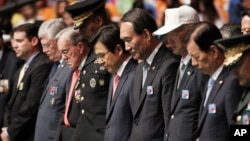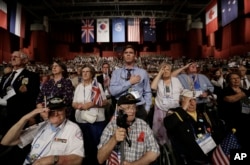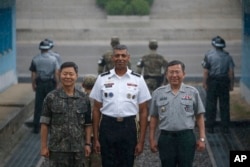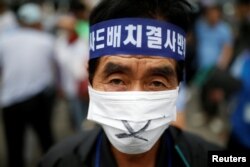On the 63rd anniversary of the end of the Korean War, lasting peace remains elusive as regional tensions have increased and relations between Seoul and Pyongyang have regressed over the North’s nuclear program.
On Wednesday, the South accused the North of floating bags of propaganda messages down river into Seoul. The leaflets contained threats to launch missile attacks and longstanding propaganda that the North won the Korean War.
The Korean Peninsula was divided into the Soviet-backed communist North and the American allied South after it was liberated from Japanese colonial rule at the end of World War II.
The Korean War, which began in 1950, escalated to include an American led United Nations coalition to defend the South against an attempted invasion by the North, and Chinese forces fighting in support of their communist ally.Approximately five million soldiers and civilians died in what became a war of attrition that never technically ended. On July 27, 1953 the warring parties signed an armistice to end hostilities, but never signed a peace treaty.
The fragile peace continues to hold today but North Korea’s recent nuclear and ballistic missile tests have made the situation more volatile.
ASEAN security meeting
North Korea's Foreign Minister Ri Yong Ho on Tuesday said that the possibility of further nuclear tests depends on the Untied States.
Speaking on the sidelines of an Association of South East Asian Nations (ASEAN) meeting in Laos, Ri said North Korea was a responsible nuclear state and would not use its atomic arms unless threatened.
The North Korean foreign minister also said his country has proposed peace talks many times but the South Korean government has refused to engage.
South Korea’s Unification Ministry Spokeswoman Park Soo-jin on Wednesday reiterated the position of both Seoul and Washington that Pyongyang must first halt its nuclear program before any talks to reduce tensions and end sanctions can occur.
“I would like to tell you that the goal of our policy on North Korea is peaceful reunification of the Korean peninsula. For peaceful reunification, the priority task is for North Korea to make changes related to denuclearization,” Park said.
In March, the United Nations imposed harsh new international sanctions on Pyongyang for again violating Security Council resolutions banning North Korea from developing nuclear and ballistic missile weapons.
South Korea also closed the jointly run Kaesong Industrial Complex, which employed over 54,000 North Koreans.The Kaesong project was the last remaining cooperative program developed to build trust between the two Koreas.
THAAD divides
Both Beijing and Moscow pledged to support the sanctions, but new strains over the deployment of an American missile defense system in South Korea could weaken their resolve.
China and Russia continue to voice strong opposition to the U.S. Terminal High Altitude Area Defense (THAAD) system to be deployed in South Korea, saying its purpose is to increase U.S. military power in the region and that the system’s powerful radar will be used to monitor their military installations.
China’s relations with North Korea have been strained by Pyongyang’s nuclear provocations but in a sign of warming ties, the North Korean foreign minister met with his counterpart Chinese Foreign Minister Wang Yi at the ASEAN security meeting in Laos.
Under President Park Geun-hye, South Korea has worked to improve diplomatic and economic ties with China.
But Park’s decision to side with Washington to deploy THAAD, over the objections of Beijing, may have pushed the limits of that relationship.
“It was a valuable lesson for South Korea and China to a certain extent [to gauge] how much progress is actually possible by mutual cooperation and effort,” said North Korea analyst Bong Young-shik, with the Asan Institute for Policy Studies in Seoul.
Abduction threats
South Korea also warned its citizens in China and Southeast Asia this week of the risk of "dangerous acts" by North Korea.
The warning came after South Korean media said the North had sent teams of agents to those places to harm or abduct South Koreans in retaliation for the South's granting of asylum to workers from a restaurant run by the North in China.
Youmi Kim in Seoul contributed to this report.








